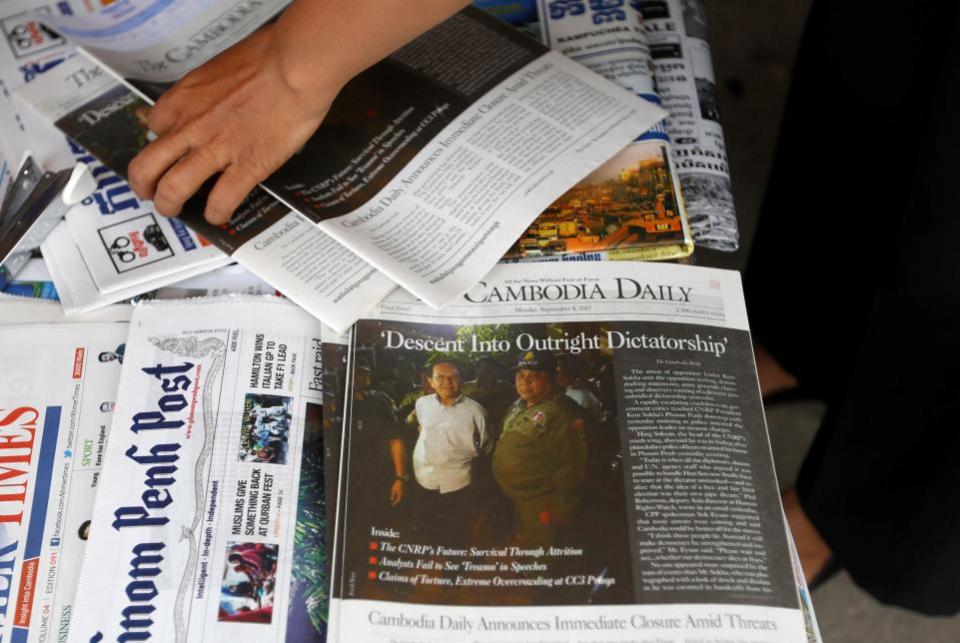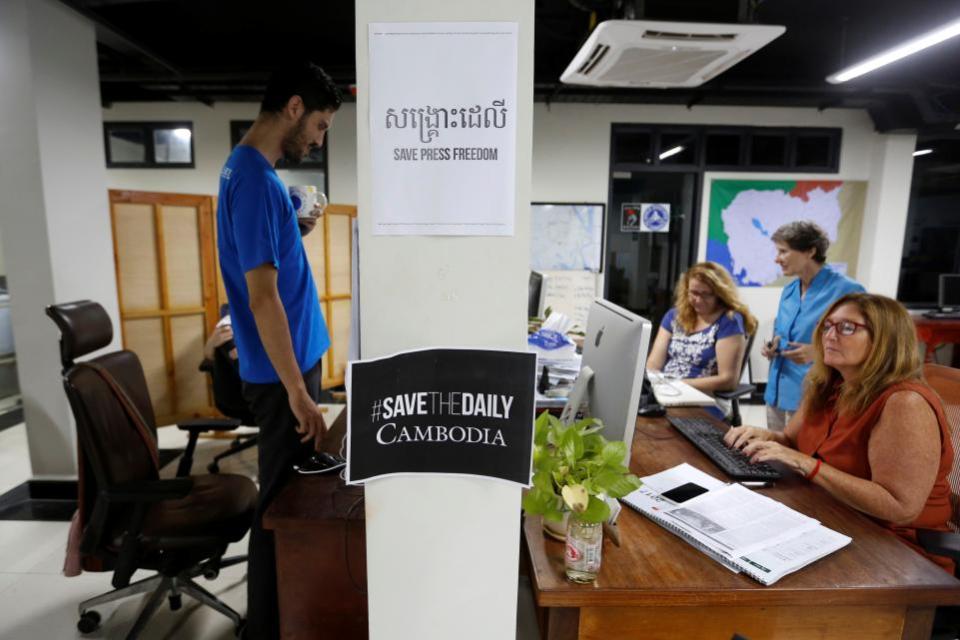Cambodia Shut Our Paper Down. Don't Let Trump Do That
Having served its readers for 24 years, The Cambodia Daily published its last issue on Monday after the government presented the paper with an ultimatum: pay an enormous tax bill or shut down. Two reporters tell Newsweek what the paper meant to them and to a country whose democratic institutions are under threat.
Leng Len covered social justice and labor migration. She wrote one of the paper’s last cover stories, titled “Maid Home After 12 Years ‘Stranded’ in Saudi”.
Today was my last day of reporting for The Cambodia Daily, after working there for a little more than a month.
After I heard about the arrest of the opposition leader Kem Sokha in the early hours of Sunday morning (about 12.30am), I found myself unable to fall asleep. In my few weeks working with the Daily, I had been completely imbued with a fearlessness that is characteristic of my fellow journalists and mentors who have been working there for years.
Braving a mild fever and lack of sleep, I went out to the National Police headquarters and covered the breaking story of the arrest. I stood outside for an hour, making several phone calls to the authorities and opposition leaders, and several failed attempts at getting the police security guard to answer my questions.
My colleagues and I worked through the night to fact-check and gather more information about the arrest, well aware of the gravity of the situation, and the urgent necessity of informing the public about this. It was Saturday night, but we told ourselves: “Let’s not sleep, we gotta do the story.”

I feel completely empty and devastated to lose the chance to continue exercising the journalism skills I learned at journalism school. To me and to the readers, who are NGO workers, artists, private sector employees and the students who read English, the loss of the paper is a big one, the loss of an independent fact-checker.
I normally talked to underprivileged people, like Cambodian migrant workers who are in Thailand facing having no access to legal work documents. Every conversation I had with them made me think of “Bringing voice to the voiceless,” my goal as a reporter.
The information we reported to the public will now be missing. How else will people in rural areas, academics, students and business people access independent news?
We received so much reaction from our readers: some angry, some sad, but also praise for our work. One of our regular readers wrote to us: “It was you who kept me and other countless Cambodians, who are sick and tired of hearing overpraised statements and one-sided commentary broadcast on TV, informed about what is really happening in this Kingdom of Endless Wonders. It was you who alerted my Facebook newsfeed when Dr. Kem Ley was shot in broad daylight. It was you who gave chances to countless young Cambodian students like me and others to share our opinions on issues facing this country. It was you who pushed me to step up and exercise my civic rights and express my thoughts to the press. It was you who made me believe that I no longer need to be an expert, a minister or a CEO to have my say heard. And now, it is you again who leaves me.”
Hang Sokunthea was a business reporter for the newspaper and Media Professor at Pannasastra University of Cambodia.
The polarized media landscape in Cambodia has been an issue since the country received its independence following the civil war in the 1970s. While freedom of the press is enshrined in the constitution, some outlets practice self-censorship if they don't want to upset the government, or end up being owned by government-affiliated elites that will push stories favoring the ruling party.
Keeping to its motto, “All the News Without Fear or Favor,” The Cambodia Daily played an important role as an independent English-language daily newspaper to bring the truth about Cambodia to Cambodians and to the world, without being influenced by government pressure.

In May, when Cambodia hosted the World Economic Forum on ASEAN for the first time, even the foreign press came to realize just how strong these pressures were.
Hun Sen, the long-time leader of Cambodia, used the press conference to lecture me and a colleague from another publication. We had been asking about policy. He told me that if I didn't quote him properly I would be viewed as a "servant of the foreigners" who were "opposing [him] all the time."
On the following day, the intimidation of the press appeared in many international news outlets, as well as The Cambodia Daily and The Phnom Penh Post, the two oldest English-language outlets in town. In contrast, most of the state-controlled local news outlets focused on the parts of his speech about the development of the Cambodian economy, as well as referring to us as the "servant of the foreigners."
I will never forget what a German journalist said to me after the press conference. "I think Hun Sen disgraced himself when attacking the local press,” he said, adding that one of his colleagues told him “I am so happy that I don't have to work as a journalist in this country."
Looking ahead, many young, educated Cambodians and I share serious doubts about this country’s future. We all know that this will be just the first step to further hardship on the path to a democratic society, or may even represent going backward.
One thing that I know for sure is that we as media professionals have to stay true to our values in spite of these new developments. We have to continue fighting for our rights, for freedom of the press to report news without fear or favor.
Related Articles


